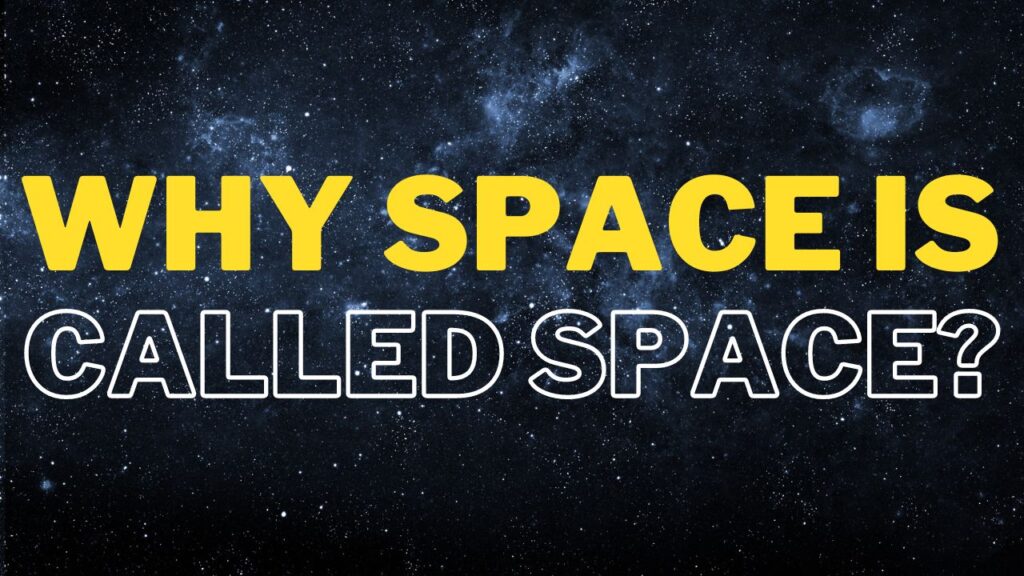
Space has always intrigued humans, from ancient astronomers to modern scientists. But have you ever wondered why space is called space? The vast expanse beyond our planet, filled with stars, planets, and galaxies, goes by a simple yet profound name. In this article, we’ll dive into why this term was chosen and explore its meaning in a way that makes it easy to understand.
A Simple Explanation
The term “space” comes from the Latin word spatium, meaning “a room” or “an interval.” Early thinkers used this to describe the open area beyond Earth. But why space is called space goes beyond just etymology. It’s about the emptiness and the vast distances between objects, planets, and galaxies. Essentially, space is the “room” in which celestial bodies exist—an infinite playground for the cosmos.
The Emptiness Behind Why Space is Called Space
When you look up at the night sky, it seems like there’s a lot going on—stars twinkling, planets glowing. But in reality, the majority of space is empty. That emptiness is a big reason why space is called space. Unlike Earth, where everything is filled with air, oceans, and land, space has vast areas where there is practically nothing.
Take the distance between Earth and the Moon as an example. Although we think of the Moon as “close,” it’s about 384,000 kilometers away, and almost all of that distance is empty space. That gap—the lack of physical matter between celestial bodies—is what defines why space is called space.
Why Space is Called Space and Not Something Else?
Many might wonder, with so many languages and cultures, why space is called space globally. Well, it’s simple. The concept of vast, open nothingness is universal, regardless of language or background. The word “space” sums up the sheer scale and emptiness of the universe.
For instance, imagine an empty room in your house. The absence of furniture or objects makes it feel like “space.” Similarly, the universe has its own “rooms” of emptiness between planets and stars, making “space” a fitting description.
Why Space is Called Space: A Historical Perspective
Why space is called space can also be linked to historical shifts in understanding. In ancient times, people thought of the cosmos as a set of perfectly aligned spheres. But as science evolved, so did our perception of the universe. Astronomers like Copernicus and Galileo helped reshape our view, showing that space wasn’t a set of solid spheres but rather a vast emptiness where celestial bodies moved freely.
Thus, the word “space” captured this new understanding perfectly—a boundless, empty void with scattered objects in it.
Why Space is Called Space in Modern Science
Today, scientists continue to explore the vastness of space with advanced telescopes and probes. But even with our most sophisticated technology, the majority of the universe remains empty. This is one more reason why space is called space—because no matter how much we discover, the emptiness always outnumbers the objects within it.
An example of this is the Voyager 1 probe, which has been traveling through space for over 40 years and is now more than 23 billion kilometers away from Earth. Despite that immense journey, it’s still moving through mostly empty space, with only the occasional cosmic particle crossing its path.
Conclusion: Why Space is Called Space—More Than Just a Name
In summary, the reason why space is called space is rooted in its nature as a vast, empty expanse that holds everything together. The term perfectly captures the emptiness, vastness, and mystery of the universe. So, next time you gaze at the stars, remember: you’re not just looking at the light; you’re also looking into the very “space” that makes the universe what it is.
FAQ
Space is called “space” because it refers to the vast, mostly empty expanse beyond Earth’s atmosphere. The term comes from the Latin word spatium, which means “room” or “interval.” It highlights the emptiness and the immense distances between objects like planets and stars.
In the context of the universe, “space” means the nearly empty areas between celestial bodies. It represents the void where planets, stars, and galaxies exist, surrounded by massive expanses of nothingness.
While space is mostly empty, it’s not completely void of matter. There are particles, dust, and cosmic rays spread throughout, but the density is extremely low compared to what we experience on Earth. This emptiness is why we call it “space.”
The concept of space has been discussed for centuries, but the modern usage of “space” in astronomy evolved with scientific discoveries during the Renaissance. Early astronomers like Copernicus and Galileo helped shape our understanding, leading to the use of the term “space” to describe the universe’s vastness.
“Space” became the standard term because it effectively captures the idea of emptiness and distance between celestial objects. The word’s simplicity and universality made it easy to adopt across different languages and scientific communities.
Scientists define space as the region beyond Earth’s atmosphere where there is no significant air to scatter light or support life as we know it. It’s the area where objects like satellites, planets, and stars exist, in an environment of low pressure and near-vacuum conditions.
Space is important because it helps us understand the universe, our origins, and the laws of physics. Studying space leads to advancements in technology, helps predict cosmic events, and may one day provide new places for human exploration and settlement.
Space is incredibly vast, essentially infinite from our perspective. The observable universe stretches about 93 billion light-years in diameter, but it’s believed to extend far beyond what we can currently see.
Astronauts refer to it as “outer space” to distinguish it from Earth’s atmosphere and the area near our planet. It emphasizes the region beyond where air and gravity exert significant influence, marking the beginning of the vacuum-like environment.
“Space” refers to the empty regions between celestial bodies, while “the universe” includes everything—space, time, matter, and energy. In short, the universe contains space, along with all stars, galaxies, and planets.